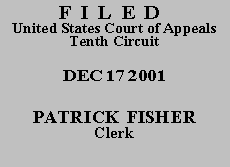

| MICHAEL J. STICKNEY and
DENISE E. STICKNEY,
Plaintiffs-Appellees, v. ARTHUR L. DICK, M.D., individually and doing business as Arthur L. Dick, M.D., Inc.; HIGH COUNTRY UROLOGY and ARTHUR L. DICK, M.D., INC., Defendants-Appellants. |
|
In this diversity case, Michael J. Stickney and his wife Denise E. Stickney sued Arthur L. Dick, M.D. for medical malpractice arising out of a vasectomy. Following a four-day trial, the jury found in favor of the Stickneys, awarding Michael $662,830 in damages for past and future economic losses, noneconomic harm, and physical impairment. Additionally, the jury awarded Denise $50,000 for loss of consortium. This appeal followed. We exercise jurisdiction pursuant to 28 U.S.C. § 1291, and we affirm.
Because the parties are well-versed in the underlying facts, we forego their recitation unless necessary for the issue on review. On appeal, Dr. Dick makes three arguments concerning the propriety of the physical impairment damage award. He contends that the district court erred in (1) refusing to include the physical impairment award within the $250,000 cap for noneconomic damages established by Colo. Rev. Stat. § 13-64-302 (2001), a provision of the Colorado Health Care Availability Act; (2) submitting the issue of physical impairment damages to the jury; and (3) providing the jury with a damages instruction which led to a duplicative physical impairment award.
The Colorado Supreme Court has recently addressed similar arguments. In the case of Preston v. Dupont, No. 00SC492, 2001 WL 1402551 (Colo. Nov. 13, 2001), that court held that the $250,000 cap on noneconomic damages does not limit damages for physical impairment and that a jury in a medical malpractice action may be instructed to award a separate category of damages for physical impairment. Id. at *1, *9.(1) In a diversity case, "the duty rests upon federal courts to apply state law . . . in accordance with the then controlling decision of the highest state court." Vandenbark v. Owens-Illinois Glass Co., 311 U.S. 538, 543 (1941). The Colorado Supreme Court's holdings dispose of Dr. Dick's first two arguments concerning the physical impairment award.
Moreover, we have reviewed the district court's Instruction No. 19, relating to the jury's damage determination. We conclude that, Instruction No. 19, when taken together with the remaining instructions, accurately informed the jury of the law and cautioned against an award of duplicate damages. See United States v. Cerrato-Reyes, 176 F.3d 1253, 1262 (10th Cir. 1999) (stating that "[w]e review the district court's decision to give a particular jury instruction for abuse of discretion and consider the instructions as a whole de novo to determine whether they accurately informed the jury of the governing law"). We find no abuse of discretion in the district court's giving of Instruction No. 19.
Dr. Dick asserts three other claims of error, unrelated to the physical impairment award. First, he maintains that the district court erred in submitting the case to the jury because the evidence was insufficient to show that his actions were the proximate cause of Mr. Stickney's injuries. "Proximate cause is a factual question in Colorado unless the facts are undisputed and reasonable minds can draw only one conclusion from them." Berg v. United States, 806 F.2d 978, 981 (10th Cir. 1986). The expert testimony in this case is adequate to support a conclusion that Dr. Dick's negligence was the proximate cause of Mr. Stickney's injuries. Consequently, there was no error in submitting the causation issue to the jury.
Finally, Dr. Dick claims that the district court erred in refusing to give several proposed jury instructions, concerning the absence of a guarantee of a cure, the lack of a presumption that a bad medical result is evidence of negligence, and contributory negligence on the part of Mr. Stickney. We review a district court's decision not to give requested jury instructions for an abuse of discretion, but review the instructions as a whole de novo to determine whether they correctly and adequately stated the governing law. Powers v. MJB Acquisition Corp., 184 F.3d 1147, 1152 (10th Cir. 1999). After a review of the record in this case, we see no abuse of discretion in the district court's refusal to give the proposed instructions.
The judgment of the district court is AFFIRMED.
Entered for the Court
Circuit Judge
*. This order and judgment is not binding precedent, except under the doctrines of law of the case, res judicata, and collateral estoppel. The court generally disfavors the citation of orders and judgments; nevertheless, an order and judgment may be cited under the terms and conditions of 10th Cir. R. 36.3.
1. Because the issues were parallel, we formally abated this case awaiting the Colorado Supreme Court's ruling in Preston. That case having been decided, this case is reactivated.